EU Is Not London, Prague or Lisbon but Brussels
Adelina Marini, March 27, 2014
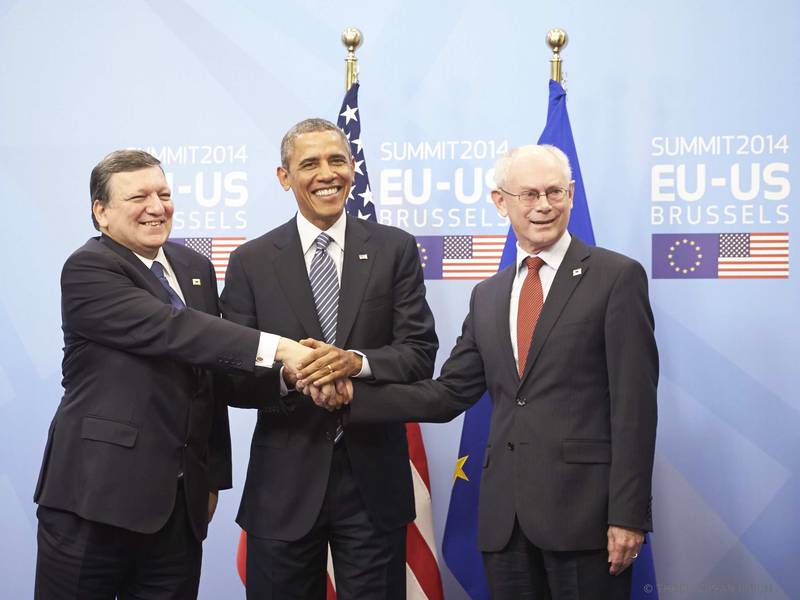 President Obama came to Europe in a tough geopolitical moment for the continent to convey several very strong messages. One is to confirm that the US stands behind Europe. The second is that this now has a price. And the third is that the new geopolitical situation in Europe's neighbourhood is mainly a European problem which will not change Washington's new foreign policy priorities. It can be said that there is a fourth message unless we count it as a lapsus. To Mr Obama, the European Union is Brussels. "Over the years we've met in Prague, we've met in London or in Lisbon. We've met at the White House. We've met in Northern Ireland. This week in the Hague. So, it's good to finally meet the presidents of the EU at the EU", the American president said during the joint and rather brief press conference with European Commission President Jose Manuel Barroso and European Council President Herman Van Rompuy.
President Obama came to Europe in a tough geopolitical moment for the continent to convey several very strong messages. One is to confirm that the US stands behind Europe. The second is that this now has a price. And the third is that the new geopolitical situation in Europe's neighbourhood is mainly a European problem which will not change Washington's new foreign policy priorities. It can be said that there is a fourth message unless we count it as a lapsus. To Mr Obama, the European Union is Brussels. "Over the years we've met in Prague, we've met in London or in Lisbon. We've met at the White House. We've met in Northern Ireland. This week in the Hague. So, it's good to finally meet the presidents of the EU at the EU", the American president said during the joint and rather brief press conference with European Commission President Jose Manuel Barroso and European Council President Herman Van Rompuy.
The announced as a EU-US summit visit of Barack Obama in Brussels is part of his European tour of key capitals caused by the tensions Russia created by annexing the Ukrainian territory of Crimea. In European Council and Commission documents preceding the summit it was pointed out that Ukraine will be a major issue on the summit agenda, but the introductory remarks of the American president at the press conference after the talks, which lasted some two hours and a half, suggested that for the US the priority issues are different. When enumerating the discussed issues, Mr Obama started with Iran, continued with Syria and the Asia-Pacific region. After all this he said: "Obviously much of our focus today was on the situation in Ukraine", which sounded as if the issue was not to his liking and he was forced to focus on it.
EU more lonely than ever
After the abrupt change of behaviour of Russia's President Vladimir Putin, the European Union faced a reality which, due to the development of the 21st century, it constantly swept under the rug - the fact that it is a loose union of states with various and sometimes contradictory interests, with a different level of energy dependence and defence capabilities. The single foreign policy is just a fata Morgana which in periods of peace and prosperity seems quite real, but when it comes to real actions it disappears. The difficult to achieve compromise for sanctions against Russia because of uncertainty whom they will harm the most has denuded the EU and a large part of its members.
In the past decade, the Union and the US have distanced significantly from each other because their views and foreign policy priorities diverged. In addition, US continued not to receive an answer to its numerous calls the member states to increase or at least not to cut their defence spending and not to rely that the US will always be by the Europeans' side when danger comes. This was clearly evident during the Arab spring and especially during the Libyan crisis. Besides, in the past years, as if contradictions increased for the sake of contact points, like, for instance, the revelations that heads of state of the member states were eavesdropped by the US National Security Agency or when the US refused to introduce the reciprocity which the EU demanded for data exchange.
In the past decade, the US entirely changed its geopolitical behaviour. The European neighbourhood and the Middle East ceased to be a focus of US attention. A new central priority is the Asia-Pacific region. One of the reasons for this is that, on the one hand, with the development of technologies, US turned from an energy importer into a country with energy surplus because of the development of sources of shale gas. And on the other hand, the Asia-Pacific region is, at the moment, in economic and political boom.
Russia has again brought EU and US closer together
The return of the Soviet nightmare, however, reminded the EU and the US that the two parties share, may be, the most important thing - a common system of values. President Obama said in Brussels precisely what Europe wanted to hear - that Europe is America's closest partner. Under Europe, though, President Obama means not just the EU. "Europe, including the EU, is the cornerstone of our engagement around the globe. We are more secure and we are more prosperous. The world is safer and more just when Europe and America stand as one". This was music to President Barroso's ears who said that the visit of the American president sends a very strong signal. "Your visit sends a very strong signal. First of all to the European citizens, in the sense of how important this transatlantic relationship is for Europe and for the United States of America".
The new geopolitical situation has brought two large benefits for the Transatlantic relations. The first is a strengthened commitment for the Trans-Atlantic Trade and Investment Partnership as negotiations have been ongoing for a year now. This is a special free trade agreement with the negotiations on which were stalled for years. Just a year ago, however, again during a brief EU-US summit, President Barack Obama gave a green light to the launch of the negotiations. On March 10-14 the fourth round took place. In a joint declaration after the summit on March 26, however, a much stronger commitment is taken for a quick wrap up of the negotiations. "Today we reaffirmed our commitment to conclude expeditiously a comprehensive and ambitious Transatlantic Trade and Investment Partnership (TTIP) that will strengthen an economic partnership that already accounts for nearly half of global output [...]".
Beside a commitment for faster completion of the negotiations, the US has agreed to introduce the so desired by the EU reciprocity in terms of data exchange. Washington makes not only a commitment but speed, too. In the declaration, a commitment is made to accelerate the negotiations on an umbrella agreement for protection of data exchange in the area of police and judicial cooperation, as, according to Herman Van Rompuy, these negotiations will start in June which is a huge victory for the European  Union. Against the backdrop of the growing authoritarianism which endangers freedom on the Internet, EU and US agreed to work together for the protection of privacy and freedom of speech on the Internet.
Union. Against the backdrop of the growing authoritarianism which endangers freedom on the Internet, EU and US agreed to work together for the protection of privacy and freedom of speech on the Internet.
Nothing of this, though, will come for free no matter the shared values and views. One of the big issues during the talks was energy security. Against the backdrop of the EU's serious energy vulnerability, the US is ready to help but this will happen in the framework of the transatlantic trade agreement. Teams from the two parties will begin intensive talks as early as next week to find ways to deepen energy cooperation. But during the news conference one very serious warning emerged - Europe should not rely that it will simply turn westward and there it will find a new energy source without making an effort to develop its own sources.
The fact that energy was at the centre of talks, according to Barack Obama, shows that Europe needs to seriously think about diversification of its energy sources. US, he said, is "blessed" with additional energy sources and licenses have been issued to export as much natural gas daily as Europe consumes every day. However, the gas is for sale on the open market. That is why, one of the options will be to agree certain quotas in the framework of the trade agreement. "There's no perfect, free, ideal, cheap energy sources. Every possible energy source has some inconveniences or downside. I think that Europe, collectively, will need to examine, in light of what's happened to explore, other sources. US is one possibility. But we're also making choices and taking on some of the difficulties and challenges of energy development and Europe will have to go through some of those same conversations as well".
In this way, Barack Obama looked EU in the eye and told them openly that they will have to hold a very serious talk about shale gas which has its shortcomings as a technology and that certainly was a difficult decision in the US. But it is out of the question America to destroy its nature to feed Europe, was Barack Obama's message. It is important to underscore that he used the word "collectively", thus obviously inviting the Europeans to discuss common actions together, not go for individual plans. According to Jose Manuel Barroso, the developments in Ukraine have served as a very strong wake-up call for the European leaders who are aware of the situation. "But it's certainly good news that US has this policy of putting shale gas on the international market. It's a blessing for the US but for the world as well. Because countries like the European countries will be less dependent on energy coming from, let's say, difficult spots", Barroso said, signalling in this way that, for now, it is much more likely EU to take advantage of the American exports until it decided whether and how to develop sources of its own.
In the joint declaration, it is written that the situation in Ukraine has proved the need of strengthening Europe's energy security and that a commitment is made to consider new efforts for cooperation in this direction. "We welcome the prospect of US LNG exports in the future [...]", the document reads and President Obama underscored that this will not happen overnight.
NATO is not dead, long live NATO
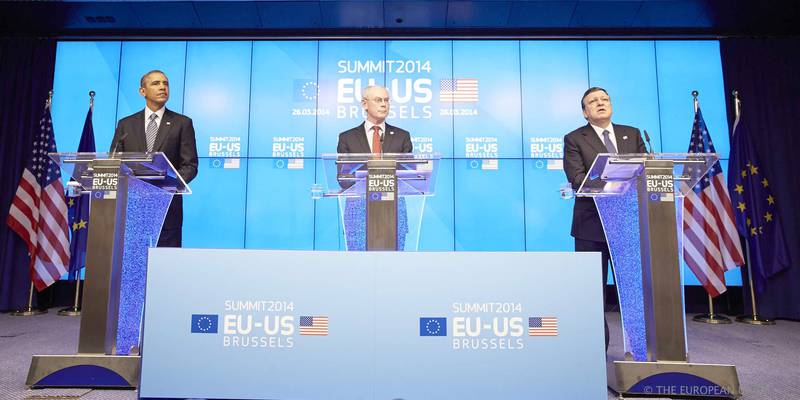 In the past decade, one of the big geopolitical questions was "do we need NATO anymore" against the backdrop of a growing partnership between the pact and Russia. Work was ongoing on a change of the mandate and structure of the organisation. Now, NATO is on its way to restore its past power which Barack Obama gave a very strong signal for, but he sent another warning, too. He said that the American commitment to NATO is the most important element of the US national security, as well as of Europe's. "So, at the core of NATO is our Article 5 commitments to collective defence". In this sense, the pact's ministers will begin discussions how to update the contingency plans in such a way to ensure regular NATO presence "among some of these states that feel vulnerable". He did not name any country, but we can safely suggest that those are Poland and the Baltic states which themselves asked for help the North Atlantic treaty and announced that they feel endangered by Russia.
In the past decade, one of the big geopolitical questions was "do we need NATO anymore" against the backdrop of a growing partnership between the pact and Russia. Work was ongoing on a change of the mandate and structure of the organisation. Now, NATO is on its way to restore its past power which Barack Obama gave a very strong signal for, but he sent another warning, too. He said that the American commitment to NATO is the most important element of the US national security, as well as of Europe's. "So, at the core of NATO is our Article 5 commitments to collective defence". In this sense, the pact's ministers will begin discussions how to update the contingency plans in such a way to ensure regular NATO presence "among some of these states that feel vulnerable". He did not name any country, but we can safely suggest that those are Poland and the Baltic states which themselves asked for help the North Atlantic treaty and announced that they feel endangered by Russia.
The US is ready to restore NATO's past glory, but not at any price. "The situation in Ukraine reminds us that our freedom isn't free and we gotta be able to pay for our assets, the personnel, the training that is required to make sure that we have a credible NATO force and an effective deterrent force", Barack Obama said and added that there is no easy and free way for defence just like there is no easy and free energy.
Looking quite exhausted and somewhat not involved, the American president came to help as a true friend of the Europeans and showed that he will continue to stand behind them, but that friendship cannot go one way only, was his main message. The EU will hardly get another chance to show that London, Prague and Lisbon are the EU, not just Brussels. Russia demonstrated as an enemy that the EU does not exist and Obama said the same in Brussels but as a friend. It is time the EU to decide is it a genuine Union or just a philosopher-idealist, but it should know that there is no place for idealists in an era of revival of realpolitik.
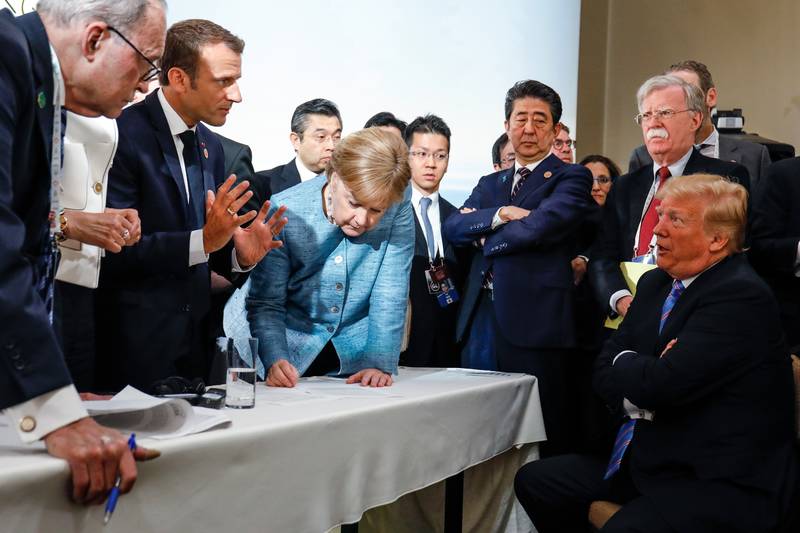 Macron, Merkel, Abe, Trump | © Council of the EU
Macron, Merkel, Abe, Trump | © Council of the EU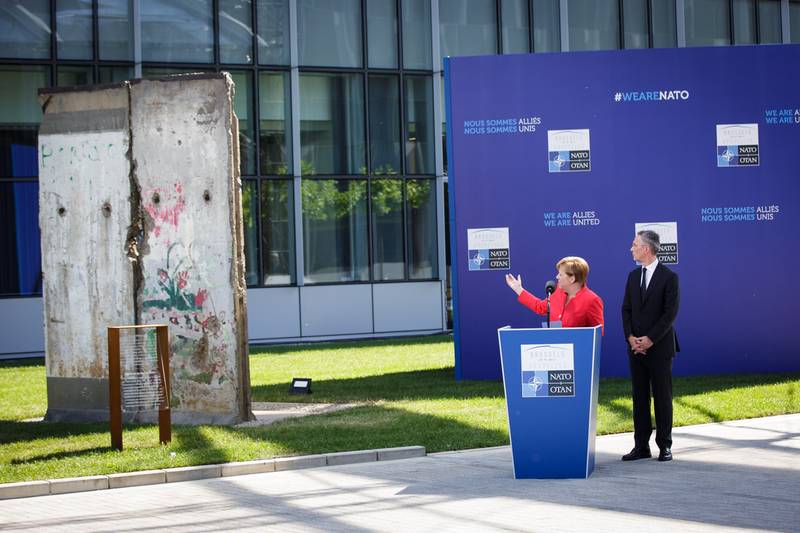 Angela Merkel | © Bundesregierung
Angela Merkel | © Bundesregierung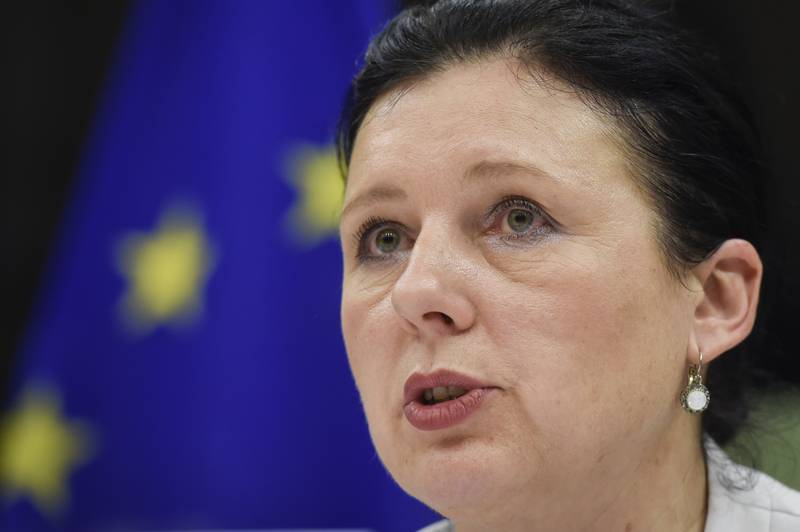 Vera Jourova | © European Parliament
Vera Jourova | © European Parliament